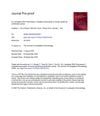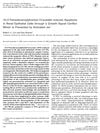 6 citations,
October 2022 in “Journal of cell science”
6 citations,
October 2022 in “Journal of cell science” Keratin genes change gradually during skin cell development and should be used carefully as biomarkers.
 6 citations,
December 2020 in “Dermatological reviews”
6 citations,
December 2020 in “Dermatological reviews” COVID-19 may worsen with androgens; anti-androgen drugs could help.
 6 citations,
November 2020 in “Molecular and Cellular Endocrinology”
6 citations,
November 2020 in “Molecular and Cellular Endocrinology” Androgens reduce BMP2, which weakens the ability of certain cells to help hair stem cells become different types of cells.
 6 citations,
March 2018 in “Journal of Medicinal Food”
6 citations,
March 2018 in “Journal of Medicinal Food” Chicken egg yolk peptides can promote hair growth by increasing a specific growth factor.
 6 citations,
November 2017 in “Scientific reports”
6 citations,
November 2017 in “Scientific reports” The R343H mutation in the VDR gene causes vitamin D-resistant rickets with alopecia by impairing specific gene activity.
 6 citations,
October 2017
6 citations,
October 2017 Indian Gooseberry has potential for cancer prevention and treatment and promotes hair growth.
 6 citations,
June 2011 in “British Journal of Dermatology”
6 citations,
June 2011 in “British Journal of Dermatology” People with alopecia areata have higher levels of RBP4 protein and antibodies against it.
 6 citations,
December 2010 in “Journal of Cosmetic Dermatology”
6 citations,
December 2010 in “Journal of Cosmetic Dermatology” Apoptosis may contribute to hair loss in androgenetic alopecia.
 6 citations,
September 2010 in “Current Urology Reports”
6 citations,
September 2010 in “Current Urology Reports” New treatments for long-lasting erections improve outcomes but must be timely to avoid lasting damage.
 6 citations,
August 2009 in “Mini-reviews in Medicinal Chemistry”
6 citations,
August 2009 in “Mini-reviews in Medicinal Chemistry” Different drugs can treat high male hormone levels in women, but they have various effects and some may harm a fetus.
 5 citations,
October 2014 in “Methods”
5 citations,
October 2014 in “Methods” The document explains how to create detailed biological pathways using genomic data and tools, with examples of hair and breast development.
 4 citations,
January 2022 in “Journal of clinical and translational research”
4 citations,
January 2022 in “Journal of clinical and translational research” Chitosan-based dressings reduce inflammation and speed up skin wound healing.
 4 citations,
May 2021 in “The journal of investigative dermatology/Journal of investigative dermatology”
4 citations,
May 2021 in “The journal of investigative dermatology/Journal of investigative dermatology” ELL is crucial for gene transcription related to skin cell growth.
 4 citations,
April 2021 in “Experimental and Molecular Medicine”
4 citations,
April 2021 in “Experimental and Molecular Medicine” The conclusion is that certain genetic factors and blood types may affect COVID-19 severity, but changes in ACE2 and TMPRSS2 genes are not clearly linked to it.
 4 citations,
February 2021 in “International Journal of Dermatology”
4 citations,
February 2021 in “International Journal of Dermatology” Prostaglandins may contribute to male hair loss; targeting them could help treat it.
 4 citations,
January 2021 in “Archives of dermatological research”
4 citations,
January 2021 in “Archives of dermatological research” The study created a new model to better understand human hair growth and health.
 4 citations,
September 2020 in “Journal of Cosmetic Dermatology”
4 citations,
September 2020 in “Journal of Cosmetic Dermatology” PRP treatment significantly increased hair density and thickness in male hair loss.
 4 citations,
September 2020 in “Annals of Translational Medicine”
4 citations,
September 2020 in “Annals of Translational Medicine” Concentrated nanofat helps mice grow hair by activating skin cells and may be used to treat hair loss.
 4 citations,
August 2018 in “Facial Plastic Surgery Clinics of North America”
4 citations,
August 2018 in “Facial Plastic Surgery Clinics of North America” Platelet-Rich Plasma (PRP), a protein-rich extract from a patient's blood, shows promise in improving hair density, thickness, and quality, but the best method of use and number of treatments needed for noticeable results are still unclear.
 4 citations,
January 2018 in “Elsevier eBooks”
4 citations,
January 2018 in “Elsevier eBooks” Hormones are crucial for regulating body functions and imbalances can lead to health issues.
 4 citations,
January 2017 in “Biological & pharmaceutical bulletin”
4 citations,
January 2017 in “Biological & pharmaceutical bulletin” Inhibiting ALOX12 can help hair cuticle maturation by increasing S100A3 citrullination.
 4 citations,
February 2014 in “Proceedings of SPIE”
4 citations,
February 2014 in “Proceedings of SPIE” Low-Level Light Therapy is effective for skin rejuvenation, wound healing, and hair growth, with mild side effects.
 4 citations,
January 2013 in “Advances in Experimental Medicine and Biology”
4 citations,
January 2013 in “Advances in Experimental Medicine and Biology” Certain transcription factors are key in controlling skin stem cell behavior and could impact future treatments for skin repair and hair loss.
 4 citations,
July 2012 in “Genesis”
4 citations,
July 2012 in “Genesis” The Megsin-Cre transgene is a new tool for genetic manipulation in the skin and upper digestive tract.
 4 citations,
May 2012 in “Tissue Engineering and Regenerative Medicine”
4 citations,
May 2012 in “Tissue Engineering and Regenerative Medicine” Scientists created three types of structures to help regrow hair follicles, and all showed promising results for hair regeneration.
 4 citations,
October 2007 in “Dermatologic Clinics”
4 citations,
October 2007 in “Dermatologic Clinics” Glucocorticoids and sex hormones affect skin health, with potential for targeted treatments to minimize side effects and treat skin conditions.
 4 citations,
January 2001 in “Archives of Biochemistry and Biophysics”
4 citations,
January 2001 in “Archives of Biochemistry and Biophysics” Activated ras can protect kidney cells from a certain substance that causes cell death.
 3 citations,
June 2023 in “Frontiers in medicine”
3 citations,
June 2023 in “Frontiers in medicine” Oxidative stress may contribute to hair loss in alopecia areata and antioxidants could potentially help as a treatment.
 3 citations,
May 2023 in “Frontiers in immunology”
3 citations,
May 2023 in “Frontiers in immunology” Faulty inflammasome activation may lead to autoimmune skin diseases and could be a target for new treatments.
 3 citations,
May 2023 in “Precision clinical medicine”
3 citations,
May 2023 in “Precision clinical medicine” Researchers found four genes that could help diagnose severe alopecia areata early.






























